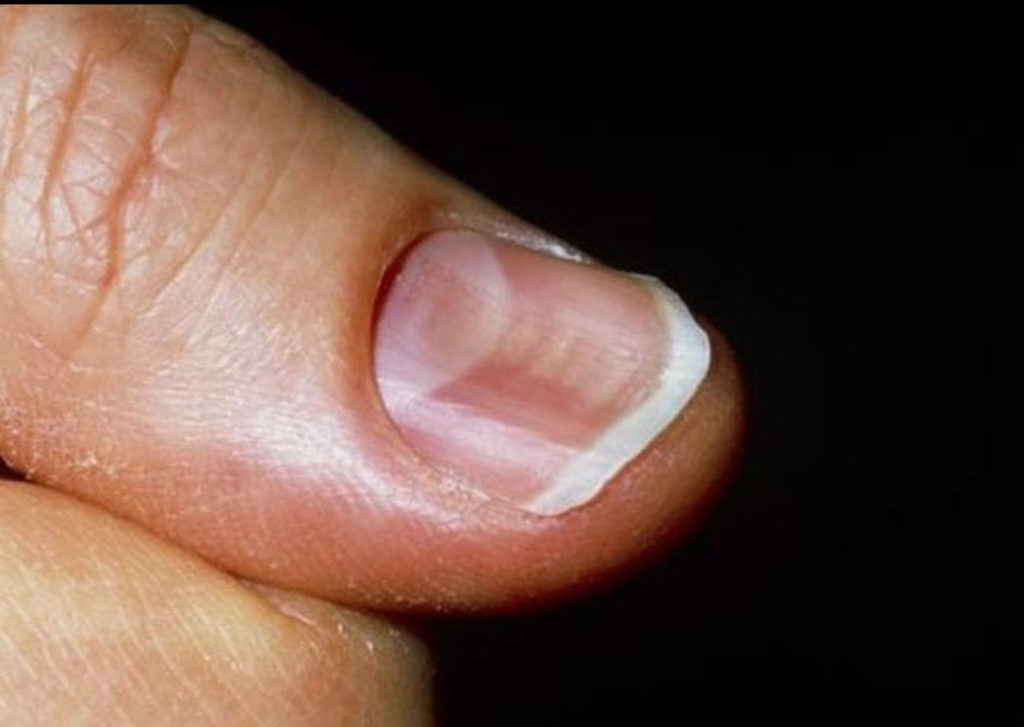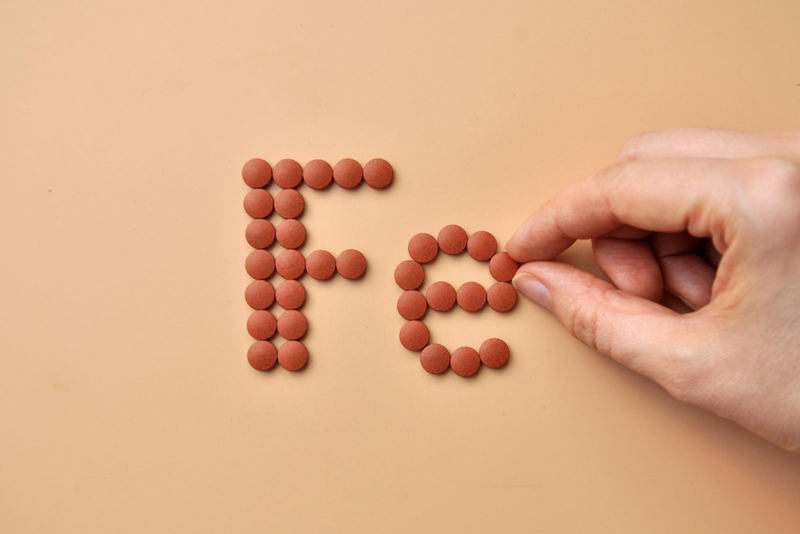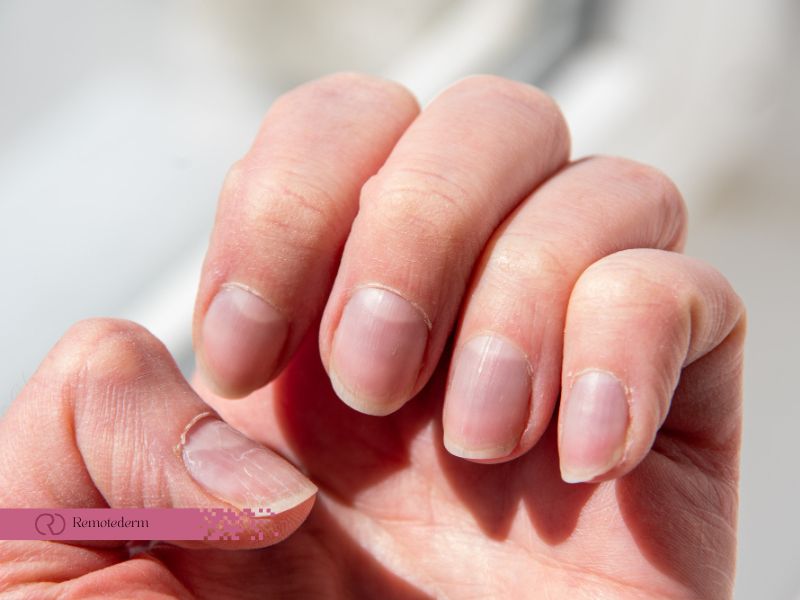Spoon nails, medically known as koilonychia, are more than just an odd nail shape—they can be a sign of underlying health issues. Understanding what spoon nails are, their causes, and how to treat them can help you maintain healthy nails. This guide covers everything from symptoms to treatments and highlights nail care tips.
So, What Are Spoon Nails?
Spoon nail, or koilonychia (medically known), happen when your nails get thin, soft, and curve inward like a tiny scoop. It’s not just one nail, either—sometimes it’s a few or all of them. Here are quick facts about spoon nail:
- They curve inward, like a spoon.
- They’re often brittle and might break super easily.
- They might look a little discolored or feel weaker than normal.
Spotting the Symptoms
Spoon nails don’t always show up with flashing warning lights, but there are a few signs you can watch for. Here’s what to Look Out For:
- Nails that are super thin and feel flimsy.
- That obvious scooped-in look.
- Breaking or splitting nails.
- Other stuff like feeling tired or pale (might mean anemia).
If you’re dealing with any of these, it’s worth chatting with a doctor or hopping on an online nail dermatology platform to get checked out.

What Causes Spoon Nails?
Spoon nails can pop up for a bunch of reasons. Most of the time, it’s your body telling you something isn’t quite right.
Why Do Spoon Nails Happen?
Spoon nails don’t just show up out of nowhere—they’re usually a sign that something’s off inside your body or with your daily habits. Let’s dive into the main reasons behind this condition:
- Iron Deficiency Anemia: Not enough iron in your system can mess with your nails big time. This is a pretty common cause, especially in Canada, where iron-rich diets aren’t always prioritized.
- Genetics: Yes, sometimes it runs in the family. Thanks, genes!
- Medical Conditions: Things like thyroid problems, autoimmune disorders, or even too much iron (hemochromatosis) can cause spoon nails.
- Everyday Damage: Constant exposure to chemicals, over-washing your hands, or bashing your nails can lead to this.
How Do You Treat a Spoon Nail?
Good news: spoon nails aren’t the end of the world. Fixing them is usually about addressing whatever caused them in the first place.
Medical Options
If spoon nails are giving you trouble, medical treatments can help tackle the root cause and get your nails back to normal:
- Iron Supplements: If low iron is the culprit, adding more to your diet or taking supplements can work wonders.
- Topical Treatments: Nail-strengthening serums or oils can help beef up weak nails.
- Online Dermatology Help: If you’re not sure what’s causing it, an expert can help—without leaving your house. For those in Canada, nail online dermatology services make it super easy to get professional advice.
Easy At-Home Fixes
Simple changes at home can make a big difference in improving your nail health and preventing further issues:
- Eat Better: Load up on spinach, red meat, beans, and other iron-rich foods.
- Step Up Your Nail Care: File gently, avoid biting (yes, seriously), and keep your nails moisturized.
- Protect Your Hands: Gloves are your best friend when cleaning or handling chemicals.

Spoon Nails in the Nail Diseases Chart
A spoon nail is part of a big group of nail problems, each with its own look and cause. A nail diseases chart can help you figure out where yours fit in.
Comparing Spoon Nail to Other Nail Issues
Sometimes, nails can reveal a lot about our overall health. Here’s a quick breakdown of how a spoon nail compares to other common nail problems:
- Fungal Infections (Onychomycosis): Thick, yellowish nails.
- Psoriasis: Pitting, ridges, and discoloration.
- Paronychia: Red, swollen skin around the nail.
- Koilonychia: Thin, inward-curving nails (yes, that’s spoon nails).
If you’re not sure what you’re dealing with, reach out to a professional. In Canada, online nail dermatology is a super convenient option.
Nail Care Tip to Prevent Spoon Nail
Spoon nail prevention is the name of the game here. Treat your nails like you’d treat your skin—with love and care. Here’s a simple nail care routine you can follow:
- Moisturize Daily: Rub some lotion or cuticle oil into your nails every day.
- Go Easy on the Polish: Let your nails breathe now and then. If you’re a polish addict, try a strengthening formula.
- Skip the Biting: Nail biting is a one-way ticket to weak, damaged nails. Stop it.
- Eat the Right Stuff: A balanced diet with enough iron and other nutrients will keep your nails in good shape.
Final Thoughts
Spoon nails might look weird, but they’re usually fixable once you figure out what’s causing them. Whether it’s upping your iron intake, improving your nail care, or checking in with a dermatologist, you’ve got options. If you’re in Canada and looking for quick advice, check out online nail dermatology services. They’re super handy and can help you get back on track without the hassle of an in-person appointment.
FAQs
Can a spoon nail mean I’m low on vitamins?
Absolutely. A lack of iron is the top cause, but deficiencies in B vitamins can also mess with your nails. A balanced diet can help.
How long does it take to fix a spoon nail?
It depends. If it’s due to low iron, you’ll see changes in a few months once your levels improve. For other causes, healing might take longer.
Can I get spoon nail from bad nail polish?
Not directly, but using harsh polishes or removers can weaken nails, making them more prone to damage.
Is spoon nail painful?
Not usually, but they can be if they’re linked to trauma or infections. If they hurt, get them checked out ASAP.
